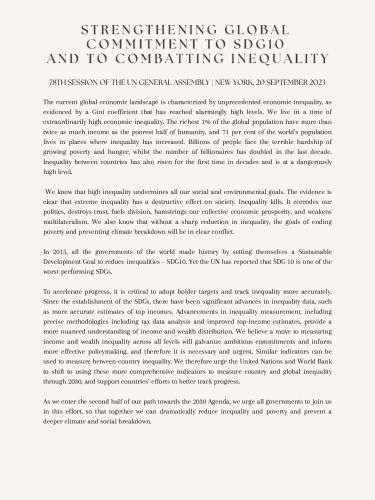Joint Statement on SDG 10 at the 78th Session of the United Nations General Assembly

The current global economic landscape is characterized by unprecedented economic inequality, as evidenced by a Gini coefficient that has reached alarmingly high levels. We live in a time of extraordinarily high economic inequality. The richest 1% of the global population have more than twice as much income as the poorest half of humanity, and 71 per cent of the world’s population lives in places where inequality has increased. Billions of people face the terrible hardship of growing poverty and hunger, whilst the number of billionaires has doubled in the last decade. Inequality between countries has also risen for the first time in decades and is at a dangerously high level.
We know that high inequality undermines all our social and environmental goals. The evidence is clear that extreme inequality has a destructive effect on society. Inequality kills. It corrodes our politics, destroys trust, fuels division, hamstrings our collective economic prosperity, and weakens multilateralism. We also know that without a sharp reduction in inequality, the goals of ending poverty and preventing climate breakdown will be in clear conflict.
In 2015, all the governments of the world made history by setting themselves a Sustainable Development Goal to reduce inequalities – SDG10. Yet the UN has reported that SDG 10 is one of the worst-performing SDGs.
To accelerate progress, it is critical to adopt bolder targets and track inequality more accurately. Since the establishment of the SDGs, there have been significant advances in inequality data, such as more accurate estimates of top incomes. Advancements in inequality measurement, including precise methodologies including tax data analysis and improved top-income estimates, provide a more nuanced understanding of income and wealth distribution. We believe a move to measuring income and wealth inequality across all levels will galvanize ambitious commitments and inform more effective policymaking, and therefore it is necessary and urgent. Similar indicators can be used to measure between-country inequality. We therefore urge the United Nations and World Bank to shift to using these more comprehensive indicators to measure country and global inequality through 2030, and support countries’ efforts to better track progress.
As we enter the second half of our path towards the 2030 Agenda, we urge all governments to join us in this effort, so that together we can dramatically reduce inequality and poverty and prevent a deeper climate and social breakdown.